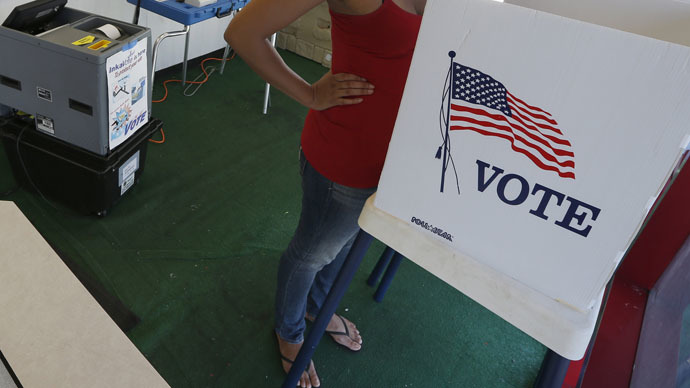Lawmakers want to restore voting rights for felons

The Democracy Restoration Act, if passed, would restore voting rights in federal elections to roughly 4.4 million US citizens out of prison that have criminal convictions.
The bill, introduced Wednesday by Sen. Ben Cardin (D-Md.) and Rep. John Conyers (D-Mich.), would restore voting rights, ensure felons never lose the right to vote in federal elections and notify them of their right to vote, Al Jazeera America reported.
New Dem bill would restore voting rights in federal elections to 4.4 million ex-felons. http://t.co/FM855ddcR5
— Zachary Roth (@zackroth) March 18, 2015
“Restoring voting rights to people with past criminal convictions will expand our democracy, increase public safety, and streamline America’s election system,” said Nicole Austin-Hillery, director and counsel of the Brennan Center’s Washington, DC office, in a statement.
“At a time when our country is considering the legacy of Selma, and the equality at the ballot box it helped bring, preventing people from voting is just not acceptable. Government at every level should act to restore voting rights and ensure our voting system is free, fair, and accessible to all eligible Americans.”
READ MORE:‘Black lives matter’: 70,000 march across ‘Bloody Sunday’ bridge in Selma (PHOTOS, VIDEO)
Currently, there are 15 states along with Washington, DC that have restored voting rights upon release from prison. The bill would end criminal disenfranchisement in the 35 other states that don’t allow felons to vote or feature restrictions on the right.
Iowa, Florida and Kentucky have permanent disenfranchisement; states like Alabama, Mississippi, Virginia disenfranchise some Americans if their crimes were violent or if the individuals committed more than one felony. Only Maine and Vermont have no restrictions on voting rights for criminals.
The disparate laws also unfairly target one in 13 African Americans by barring them from voting because of racial biases inherent in criminal justice practices across the country, according to the Sentencing Project, a group that advocates for criminal justice reform.
READ MORE:Federal marijuana laws can change if enough states reform – Obama
The bill has broad support from a diverse coalition of law enforcement associations, faith groups and civil rights organizations. Versions of the bill have been introduced before in previous congressional sessions. In February, Sen. Rand Paul (R-Ky.) introduced a bill that would restore voting rights for those who have committed non-violent offenses.
READ MORE: Record 4 in 10 Americans identify as political independents - poll
“Millions of American citizens are without a political voice in federal elections because the current patchwork of laws that disfranchise people with criminal records has created an inconsistent and unfair electoral process,” Deborah J. Vagins, senior legislative counsel for the American Civil Liberties Union, said in a press release issued Wednesday.
Because of those laws, former felons can work, pay taxes, live in a town and bring up a family, but are not allowed to participate in the political system that makes US laws and allocates funding for programs. The Brennan Center said there is momentum building in states, with bills moving in Maryland, Minnesota and Kentucky – some with bipartisan support.
There is opposition to voting rights reform for felons, however. In 2003, Alabama Republican Party Chairman Marty Connors said, “As frank as I can be we’re opposed to [restoring voting rights] because felons don't tend to vote Republican.” The Washington Post reported that Connors was right that people with low incomes, low education or minority status vote Democrat 65 to 90 percent of the time. Others argue that America shouldn’t give a law breaker a role concerning the creation of new laws.












